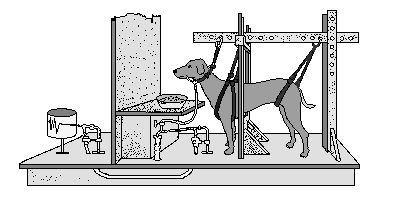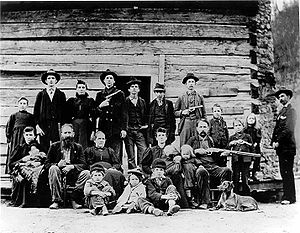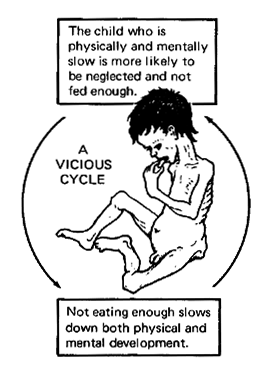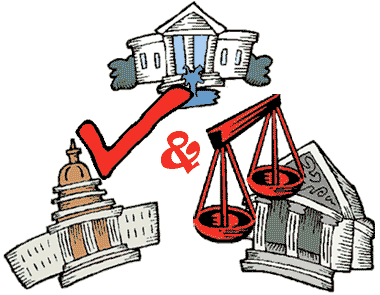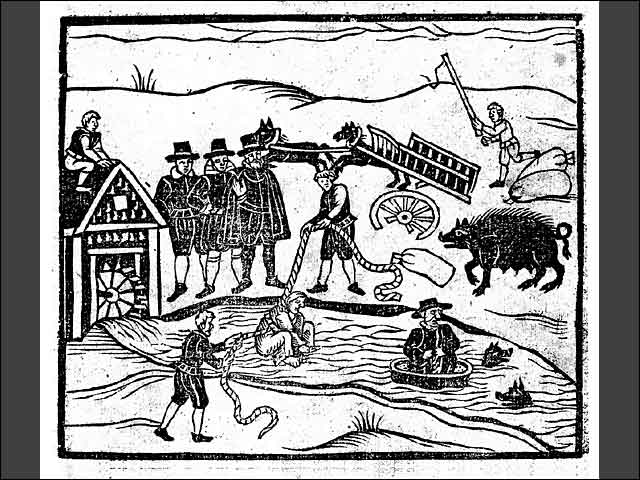monkey trap:
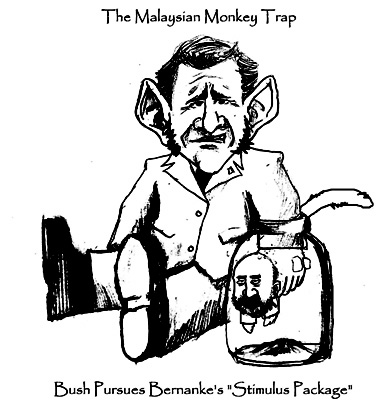
From The Schiller Institute
|
this from Will The End of Oil Mean The End of America?:
"In Zen and the Art of Motorcycle Maintenance, Robert Pirsig tells the story of a South American Indian tribe that has devised an ingenious monkey trap. The Indians cut off the small end of a coconut and stuff it with sweetmeats and rice. They tether the other end to a stake and place it in a clearing.
"Soon, a monkey smells the treats inside and comes to see what it is. It can just barely get its hand into the coconut but, stuffed with booty, it cannot pull the hand back out. The Indians easily walk up to the monkey and capture it. Even as the Indians approach, the monkey screams in horror, not only in fear of its captors, but equally as much, one imagines, in recognition of the tragedy of its own lethal but still unalterable greed."
The author (Robert Freeman) goes on to give us his take on the message:
"Pirsig uses the story to illustrate the problem of value rigidity. The monkey cannot properly evaluate the relative worth of a handful of food compared to its life. It chooses wrongly, catastrophically so, dooming itself by its own short-term fixation on a relatively paltry pleasure.
"America has its own hand in a coconut, one that may doom it just as surely as the monkey. That coconut is its dependence on cheap oil in a world where oil will soon come to an end. The choice we face (whether to let the food go or hold onto it) is whether to wean ourselves off of oil to quickly evolve a new economy and a new basis for civilization or to continue to secure stable supplies from the rest of the world by force."
|
Of course the monkey trap is a wonderful piece of bad dynamics that applies to hundreds of situations. I thought of it recently in the context of Jesus' story of the rich young man. Here it is, in the King James Version:
Mar 10:17 And when he was gone forth into the way, there came one running, and kneeled to him, and asked him, Good Master, what shall I do that I may inherit eternal life?
Mar 10:18 And Jesus said unto him, Why callest thou me good? there is none good but one, that is, God.
Mar 10:19 Thou knowest the commandments, Do not commit adultery, Do not kill, Do not steal, Do not bear false witness, Defraud not, Honour thy father and mother.
Mar 10:20 And he answered and said unto him, Master, all these have I observed from my youth.
Mar 10:21 Then Jesus beholding him loved him, and said unto him, One thing thou lackest: go thy way, sell whatsoever thou hast, and give to the poor, and thou shalt have treasure in heaven: and come, take up the cross, and follow me.
Mar 10:22 And he was sad at that saying, and went away grieved: for he had great possessions.
Mar 10:23 And Jesus looked round about, and saith unto his disciples, How hardly shall they that have riches enter into the kingdom of God!
Mar 10:24 And the disciples were astonished at his words. But Jesus answereth again, and saith unto them, Children, how hard is it for them that trust in riches to enter into the kingdom of God!
Mar 10:25 It is easier for a camel to go through the eye of a needle, than for a rich man to enter into the kingdom of God.
Mar 10:26 And they were astonished out of measure, saying among themselves, Who then can be saved?
Mar 10:27 And Jesus looking upon them saith, With men it is impossible, but not with God: for with God all things are possible.
Mar 10:28 Then Peter began to say unto him, Lo, we have left all, and have followed thee.
Mar 10:29 And Jesus answered and said, Verily I say unto you, There is no man that hath left house, or brethren, or sisters, or father, or mother, or wife, or children, or lands, for my sake, and the gospel's,
Mar 10:30 But he shall receive an hundredfold now in this time, houses, and brethren, and sisters, and mothers, and children, and lands, with persecutions; and in the world to come eternal life.
Mar 10:31 But many that are first shall be last; and the last first.
This is a great moment in the Bible.
The passage above is directly preceded by two other seminal moments in the Bible, each illustrating different parameters in social dynamics:
This is a good one for all the holier-than-thou Christian-labeled you meet. Humans are liable to ignore any "inconvenient truths", while focus on any sins they don't believe they, themselves, suffer from:
Mar 10:11 And he saith unto them, Whosoever shall put away his wife, and marry another, committeth adultery against her.
Mar 10:12 And if a woman shall put away her husband, and be married to another, she committeth adultery.
And here's another, much more positive, that gives some critical advice:
Mar 10:13 And they brought young children to him, that he should touch
them: and his disciples rebuked those that brought them.
Mar 10:14 But when Jesus saw it, he was much displeased, and said unto
them, Suffer the little children to come unto me, and forbid them not: for of
such is the kingdom of God.
Mar 10:15 Verily I say unto you, Whosoever shall not receive the kingdom
of God as a little child, he shall not enter therein.
Mar 10:16 And he took them up in his arms, put his hands upon them, and
blessed them.
Why did the disciples rebuke those who brought children? What were they
thinking? Evidently that children are not important, or perhaps bothersome. It
reminds me of another passage in the Bible in which one presumes too much:
Luk 14:7 And he put forth a parable to those which were bidden, when he marked how they chose out the chief rooms; saying unto them,
Luk 14:8 When thou art bidden of any man to a wedding, sit not down in the highest room; lest a more honourable man than thou be bidden of him;
Luk 14:9 And he that bade thee and him come and say to thee, Give this man place; and thou begin with shame to take the lowest room.
Luk 14:10 But when thou art bidden, go and sit down in the lowest room; that when he that bade thee cometh, he may say unto thee, Friend, go up higher: then shalt thou have worship in the presence of them that sit at meat with thee.
Luk 14:11 For whosoever exalteth himself shall be abased; and he that humbleth himself shall be exalted.


